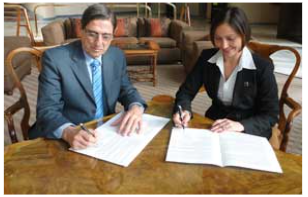
Colombia Develops Plumbing Code Based on International Plumbing, Private Sewage Disposal Codes
![]() ICC, ICONTEC agreement is an opportunity to exchange information globally to improve public health and safety
ICC, ICONTEC agreement is an opportunity to exchange information globally to improve public health and safety
After an extensive and thorough review process conducted by the Instituto Colombiano de Normas Técnicas y Certificación (ICONTEC), the Colombian National Standards Body selected the 2009 International Plumbing Code (IPC) and the 2009 International Private Sewage Disposal Code (IPSDC) as the base codes to develop the Colombian Plumbing Code. The International Code Council and ICONTEC signed an agreement to expand collaboration between the two organizations that began in 2008.
The agreement provides a framework for technical cooperation among ICONTEC and the ICC to assist in the adaptation, development and implementation of relevant ICC Codes for Colombia’s market, and to provide building code programs for ICONTEC and Colombian design and construction professionals in the plumbing field.
“We commend ICONTEC’s leadership, dedication and service that demonstrate the ICC mission and vision by adopting ICC codes and adapting them to develop Colombian technical norms,” ICC CEO Richard P. Weiland said. “This action will help to improve safety, sanitation and public health throughout the nation. It is rewarding to see our partnership with ICONTEC continuing to move forward.”
The agreement provides an opportunity for a continued exchange of information among world professionals in the water and sanitation sectors. It also provides for collaborative activities in the areas of training and education and conformity assessment to advance Colombia’s competitiveness and modernization efforts to facilitate trade and contribute to the expanding economy.
“The agreement with ICC is a strategic activity for ICONTEC, since it allows to support construction sector in the opening of new markets within the framework of Free Trade Agreements between Colombia and other countries such as the United States, and the obtaining of technological transfer from lead organizations at a world level,” ICONTEC´s Executive Director Fabio Tobón said.
Tobón highlighted the possibilities and significance of working together in other activities of interest for the two institutions, such as training and certification.
“We have been working closely with ICONTEC’s Standards Division to exchange comprehensive information and provide technical assistance for a decision making process with a strong knowledge base,” ICC Director of Global Services Sylvana Ricciarini said. “We look forward to continuing a solid partnership that the ICC and ICONTEC started more than two years ago.”
The Code Council’s Global Services staff and its Plumbing, Mechanical and Fuel Gas (PMG) Group worked closely to advance the relationship with ICONTEC and Asociación de profesionales en conducción de fluidos (APROCOF). Last year, ICC PMG’s Jay Peters and Shawn Martin joined Ricciarini and the organization’s Global Services Department to conduct a three-day workshop in Bogota, Colombia.
Hundreds of building industry professionals attended the comprehensive sessions that covered every aspect of plumbing codes. Probably the most important part of this workshop was the review of the process of implementing and transitioning from one set of codes to another. This was critical to the decision-making process as it ensured that the procedures would be as seamless and smooth as possible.
While in Colombia for the workshop, the PMG Group signed a Memorandum of Understanding between the ICC and APROCOF. This relationship was instrumental in Colombia’s acceptance of the IPC and IPSD.
The International Code Council, a membership association dedicated to building safety, fire prevention and energy efficiency, develops the codes used to construct residential and commercial buildings, including homes and schools. Most U.S. cities, counties and states choose the International Codes, building safety codes developed by the International Code Council. The International Codes also serve as the basis for construction of federal properties around the world, and as a reference for many nations outside the United States.








